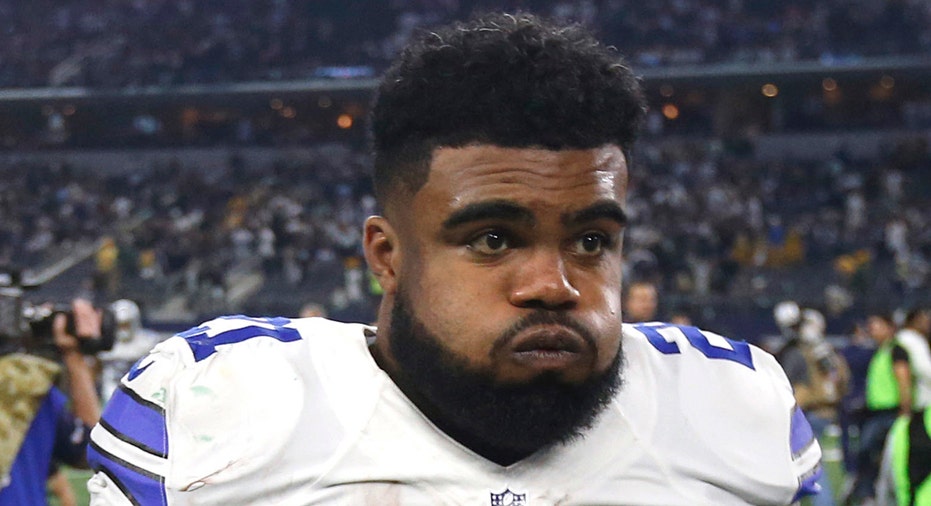Ezekiel Elliott appeal: NFL players union sues to block suspension

The NFL players union preemptively sued the league on Thursday night ahead of arbitrator Harold Henderson’s ruling on whether to uphold a six-game suspension for Dallas Cowboys star Ezekiel Elliott, alleging that the league’s handling of the appeal process has been “fundamentally unfair.â€
The lawsuit, filed in federal court in Texas, accuses the NFL of unfair practices because arbitrator Harold Henderson denied a request to have his ex-girlfriend testify at a hearing that wrapped up earlier Thursday.
The suit also claims that NFL executives hid information that was favorable to Elliott before Commissioner Roger Goodell imposed the punishment Aug. 11.
The lawsuit accuses NFL special counsel Lisa Friel of withholding from Goodell the word of co-lead investigator Kia Roberts, who the suit says concluded that the accuser wasn't credible and that discipline wasn't warranted.
"The withholding of this critical information from the disciplinary process was a momentous denial of the fundamental fairness required in every arbitration and, of course, does not satisfy federal labor law's minimal due process requirements," the lawsuit said.
Henderson is supposed to rule on the NFL's decision to suspend Elliott "as soon as practicable," according to the labor agreement. Henderson is purportedly “under pressure†to reach a decision by Monday, ESPN’s Adam Schefter reported.
The Dallas Morning News reported that Roberts recommended to NFL officials that Elliott not receive a suspension, and that a top NFL executive told Cowboys owner Jerry Jones that Elliott would not be suspended. Later, Roberts was purportedly barred from the meeting in which Friel pushed for a six-game suspension.
Elliott, the NFL's 2016 rushing leader as a rookie, was suspended after the league concluded he used physical force last summer in Ohio against Tiffany Thompson, his girlfriend at the time. Prosecutors didn't pursue the case, citing conflicting evidence.
Elliott denied the allegations under oath in the appeal hearing, according to the lawsuit. The NFL didn't immediately respond to a request for comment.
The lawsuit says the union and Elliott's representatives plan to file for a temporary restraining order in hopes of making Elliott eligible for the season opener Sept. 10 against the New York Giants.
The NFL's personal conduct policy was amended three years ago to stiffen penalties in domestic cases. Friel was hired as a result of the changes, which came after NFL was sharply criticized for its handling of a case involving former Baltimore running back Ray Rice.
The lawsuit also cited Henderson's refusal to require Goodell to testify. According to the labor agreement, Goodell can choose from a list of arbitrators for appeals.
Henderson has heard dozens of appeals, including New Orleans running back Adrian Peterson's in a child abuse case out of Texas when Peterson was with Minnesota. Henderson denied Peterson's appeal of a suspension, but a federal judge overturned Henderson's ruling.
The lawsuit claims that Roberts' conclusions weren't shared with four outside experts who advised Goodell before the ruling, and the suit makes broad claims of a "league-orchestrated conspiracy by senior NFL executives."
According to the letter Elliott received informing him of the suspension three weeks ago, the NFL believed he used "physical force" three times in a span of five days in a Columbus, Ohio, apartment last July resulting in injuries to Thompson's face, neck, shoulders, arms, hands, wrists, hips and knees.
Prosecutors in Columbus decided about a year ago not to pursue the case in the city where Elliott starred for Ohio State, but the NFL kept the investigation open. The league said its conclusions were based on photographs, text messages and other electronic evidence.
The lawsuit says Roberts prepared a document detailing inconsistencies in the accounts of Thompson, who the suit said was interviewed six times by Roberts.
"Presumably, the commissioner would have reached a very different disciplinary conclusion — one of exoneration and no discipline — had he known about the evidence which Friel and other unidentified, high-ranking NFL executives chose to conceal from the disciplinary process," the lawsuit said.
The Associated Press contributed to this report.



















